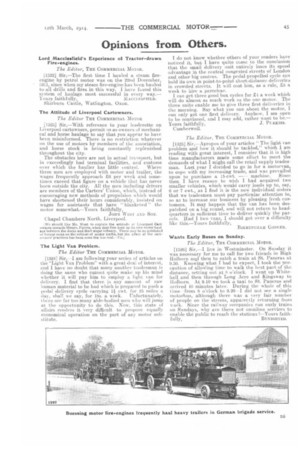Opinions from Others.
Page 21

If you've noticed an error in this article please click here to report it so we can fix it.
Lord Macclesfield's Experience of Tractor-drawn Fire-engines.
The Editor, THE COMMERCIAL Moron.
[1322J Sir,—The first time I hauled a steam fireengine by petrol motor was on. the 22nd December, 1911, since when my steam fire-engine has been hauled to all drills and fires in this way. I have found this system, of haulage most successful in every way.— Yours faithfully, MACCLESFIELD. Shirburn Castle, Watlington, Oxon.
The Attitude of Liverpool Cartowners.
The Editor THE COMMERCIAL MOTOR
[1323] Sir,—With reference to your leaderette on Liverpool cartowners, permit us as owners of mechanical and horse haulage to say that you appear to have been misinformed. There is no restriction whatever on the use of motors by members of the association, and horse stock is being constantly replenished throughout the city. The obstacles here are not in actual transport, but in exceedingly bad terminal facilities, and customs over which the haulier has little control. Where three men are employed with motor and trailer, the wages frequently approach 26 per week and sometimes exceed that figure on a vehicle that has never been outside the city. All the men including drivers are members of the Carters' Union, which, instead of encouraging new methods of propulsion which would have shortened their hours considerably, insisted on wages for assistants that have " blanketed" the motor somewhat —Yours faithfully, JOHN WEST AND Sox. Chapel Chambers North, Liverpool.
We should like Mr. West to explain the attitude of Liverpool Cart. owners towards Messrs. Fairrie, when that firm took up its own motor haul age between the docks and their sugar refinery. There may be no published or formal rules on the subject of motor traffic, but the effect of the cartowners' practices has been none the less real.En,] The Light Van Problem.
The Editor THE COMMERCIAL MOTOR.
[1324] am following your series of articles on the "Light Van Problem" with a great deal of interest, and I have no doubt that many another tradesman is doing the same who cannot quite make up his mind whether it will pay him. to employ a light van for delivery. I find that there is any amount of raw human material to be had which is prepared to push a pedal delivery cycle carrying 14 cwt. for 25 miles a
day, shall we say, for 18s. a week. Unfortunately, there are far too many able-bodied men who will jump at the opportunity to do this. Now, this state or affairs renders it very difficult to propose equally economical operation on the part of any motor substitute. I do not know whether others of your readers have noticed it, but I have quite come to the conclusion that the small delivery unit entirely loses its speed advantage in the central congested streets of London and other big centres. • The pedal-propelled cycle can hold its own in point-to-point short-distance deliveries in crowded 'streets. It will cost him, as a rule, Lb a week to hire a na.rcelcar.
I can get three good box cycles for 24 a week which will do almost as much work as the one motor. The three units enable me to give three first deliveries in the morning. Say what you can about the motor, I can only get one first delivery. Anyhow, I am open to be convinced, and I may add, rather want to be.— Yours faithfully, J. PIYEKISS. Camberwell.
The Editor, THE COMMERCIAL MOTOR.
[1325] Sir,—Apropos of your articles " The light van problem and how it should be tackled," which I am reading with great interest, I consider that it is high time manufacturers made some effort to meet the demands of what I might call the retail supply tradesman. Last year I decided to go in for a motorvan, to cope with my increasing trade, and was prevailed upon to purchase a 15-cwt. -machine. Since then I have reason to wish I had acquired two smaller vehicles, which would carry loads up to, say, 6 or 7 cwt., as I find it is the new individual orders that we tradesmen must pay particular attention to, so as to increase our business by pleasing fresh customers. It may happen that the van has been despatched on a big round, and will not return to headquarters in sufficient time to deliver quickly the parcels. Had I two vans, I should get over a difficulty like this.—Yours faithfully,
BIRMINGHAM CitIOCER.
Wants Early Buses on Sunday.
The Editor, THE COMMERCIAL MOTOR.
[1326] Sir,—I live in Westminster. On Sunday it was necessary for me to call for two friends in High Holborn ared then to catch a train at St. Pancras at 9.30. Knowing what I had to expect, I took the precaution of alloWing time to walk the best part of the distance, setting out at 8 o'clock. I went up Whitehall and then through Long Acre and Kingsway to Holborn. At 9.10 we took a taxi to St. Pancras and arrived JO minutes later. During the whole of this time.---from 8 o'clock to 9.20-1 did not see a. single motorbus, although there was a very fair number of people on the streets, apparently returning from work. Since the railway companies run early trains on Sundays, why are there not omnibus services to enable the public to reach the stations 1—Yours faith
fully, BENIGHTED.


























